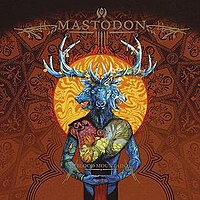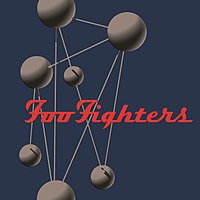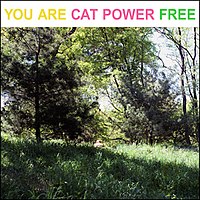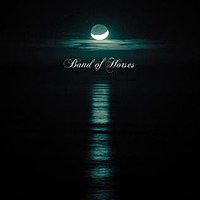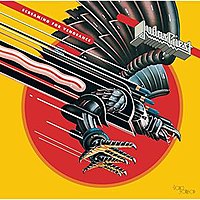
Band: Songs:Ohia
Album: The Lioness
Best song: "The Tigress," "The Black Crow" and the title track are all perfect.
Worst song: "Back on Top" isn't great.
(This is long and self-indulgent. So, if you don't want to read it, click this and it'll get you to the home page.)
We're approaching the new year, so, please, indulge my reflection. Let's go back eightish years. To the waining months of 2000 for a minute. George W. Bush and Al Gore were involved in a legal entanglement to see who would ultimately become president of the United States. I was in Journalism 200, the "weed-out" class required to gain entrance into the vaunted University of Missouri School of Journalism.
(I would later find out that half of college is just showing up and graduated journalism school on time and with a pretty good GPA.)
I was basically, assistant Program Director of the KCOU music staff. I was running much of the music staff operations, as the actual PD, let's say, delegated a lot of authority to me. I was doing a lot of heavy lifting and, for the most part, enjoying it.
I'd also, just a few months before, gone through what anyone would call a messy breakup. It's difficult to describe in any coherent way without my sounding like an immature idiot -- the actual breakup wasn't messy, but my reaction to it could charitably be called "childish" -- so, I'll spare the details. The main thing is that my ex-girlfriend and all of her friends hated me for a period -- understandably, no doubt -- and I wasn't feeling great about the whole situation.
As such, I had a big crush on a girl in several of my classes and was not exactly shy about it. Because I'm socially inept, I didn't necessarily ask her out, I just tried to get involved with her new arts newspaper (It sucked. Hard.) and hang out with her and her friends a lot (Her friends sucked. Hard.), including eventually getting my best friend to bet her on the World Series -- a bet he lost and therefore had to pierce his eyebrow (It looked terrible, though hilarious.).
It's a weird period in my life. I was still learning about Columbia and spending the vast majority of my time at the station. I saw a lot of movies at RagTag (often tailing this girl). I was getting into my time as a student, finding my groove as a b-level dude. I got some decent station friends and shed my tendency to idolize my elders at KCOU.
It's during this time that I became a vegetarian. That lasted almost two years. It's during this time that I ended up dating a (different, not the one on which I crushed) girl in which I had no particular interest. It's during this time that I lived in the dorms, yet spent the majority of my time off campus (when not at the station, of course). I started wearing glasses -- as opposed to the contacts I'd worn up until that point. Most of all, though, this was the time that my music taste went from immature to the omnivorous situation I find myself in now.
It was, as it were, the time when I turned into the person I am today. While we are all works in progress, we all have turning points. The year between late 2000 and the fall of 2001 was my big turning point.
---
The grand regret of my early adulthood is that I never kept a journal or diary for any extended period of time. That's a lie. Rather, I regret that all attempts at journaling were all done online and mostly deleted. Indeed, online journals -- now known as blogs -- last forever in the semipublic view, or at least until the server account is lost or whatever.
My regret for not journaling (or not keeping a copy of those journals) is that I have a strange obsession for my former self. No doubt this is led by my massive ego and self-centeredness, but I also like to think it has something to do also with self-reflection and introspection. What kind of person have I grown to be? How does that compare to a younger me? What does that say about the aging process, my experiences and the human experience? I wish I had a clearer view into my mind during those times, because I'm sure my recollection is different from the realities.
As such, when I did journal online, I mostly was taking my frustrations out on the world. Often, it was decidedly messy, immature and regrettable. Indeed, I now wish it never ended up on the Web, not only because I took all that stuff down and therefore have no window into a 19-year-old Ross, but rather because it sullied relationships I cherish in hindsight.
And as such, self-reflection is needed. Why did I feel the need to post everything on the Web far before Blogger, Livejournal and Typepad were accessible? Was it because I could? Was it because I wanted validation for my feelings? Was I simply searching for attention?
I don't know the answers to those questions and, eight years out, I don't know that I ever will. I still write on the Web, but they're almost entirely these masturbatory ramblings or my RS project or whatever. I think I've learned my lesson.
Indeed, there is a LiveJournal I keep, though it rarely sees a "real" posting. It's one of the more cherished things I have (if having a username and password denotes ownership). I started posting in it the summer before my girlfriend went to study abroad (senior year) and kept posting actual thoughts and such in it for more than two years.
I often reread it and marvel at the differences between me at 21-24 and me now. Age-22 Ross was full of optimism and hope. I had goals -- specifically to be an editor or columnist on a major sports page -- and I had the delightful self-centeredness of youth to power the journal. Indeed, here's a quote from April, 2003:
I almost got hit by a bike again today. I'm really tired of the bikers on this stupid campus. They have absolutely no regard for those of us walking. I cannot stand bicycle riders. In fact, I believe I wrote a column about it.
Oh, well. I'm off to go and discuss the "Matrix and Philosophy: Welcome to the Desert of Real." I haven't seen the movie in years, nor have I done the reading. I'm hoping we can talk about cloning or the ethics of cyber organics.
You never know.
That's the bulk of the entry. It's got all the highlights of any vapid online journal of a 22-year-old. Self-promotion. Self-absorption. Banal details of one's life. Schoolwork updates. The final up-in-the-air artfully detached sentence/paragraph.
It's the picture of a different person. The level of self-awareness is so low that this person actually thought that someone needed to know that he hadn't done the reading for his cyborg class and that he could negate much of the proceeding paragraph with a simple "You never know." It's someone with self-confidence. Someone lacking the simple barrier of the thought "hey, maybe you're writing about yourself too much."
And you know something? I like that guy. I like him a lot. I think he's got a freshness and an optimism that I find lacking in the adult world. I miss him terribly, but I think he's gone or has morphed into something entirely different and equally as self-absorbed.
At least that guy was funny and talked about poop or expounded on the nature of relationships, a concept that escapes me now.
---
I'm similarly self-absorbed now. I think the downfall of my early college online journaling was that I was more interested having people read what I wrote. I think I was looking for validation in some form -- again, this was before comments on posts, as no blogging software was widespread yet. In true self-obsessed emo fashion, I desperately wanted to have my feelings validated by my friends, the people involved, whoever.
I guess my current situation is more based on my own confidence.
(Time to hop on the couch...)
One thing age has given me is a sense of realism. I'd say I have a much more accurate view of myself now than I did at 22, largely because I've spent the vast majority of my time thinking about myself (again, self-absorbed). I know I'm not going to be Lester Bangs or Tony Kornheiser or David Eggers or Chuck Klosterman or whoever. And as each day goes by, there's a smaller chance that I'll do any of the things they do.
Indeed, that is part of the Web's greatness. I don't have to know someone at a publishing house to write a book, as you can self-publish with Lulu.com. I don't have to know someone at RS or Pitchfork or wherever to write about music. I do it here. I may not get an audience -- I almost certainly don't have one -- but I can certainly put my writing out there. If one person reads it, I'm happy. If no one reads it, I'm happy.
And as such, I've sort of come to terms to my reality: I'm just a dude. I'm not going to be someone famous or important or whatever. I'm just a guy who works for a magazine and has a few hobbies. And that's kind of where I put this project, the RS project and, oddly, my softball team.
There's an excellent documentary called Darkon about a bunch of -- yes, I'll say it -- nerds who participate in LARP, live action role playing. These -- again, I have no problem saying this -- nerds are just regular dudes in real life. They work in IT or they're store clerks or they work in gas stations or they're stay-at-home-dads or whatever. But, every weekend, these guys are knights and kings and emperors. They control "countries" and "subjects." They command "armies." At least in their own minds and certainly in the game.
(Really, though, they're just nerds dressed like morons running around a field with Nerf swords.)
This is softball to me. Every day, I work at a job I enjoy, but it it ultimately, my job. My delusions of grandeur are not absent and being a lower man on the company ladder does not satisfy this need. However, every Sunday from April to early November, I find myself dressing like a moron with expensive equipment acting like I'm playing in the seventh game of the World Series. I wear batting gloves and baseball pants. I have high socks. I slide. A lot.
There's no difference, by the way, between those two. I play softball to role play some sort of baseball dude. I'm really just a short, fat guy in a ridiculous outfit, but in my mind, I'm fucking A-Rod.
For many of us, our profession is where we find out value. For others, it's in family. I love my job, but I do not define myself by it. My family is not how I define myself, either (that is as diplomatic as I'm going to be about that one). For me, it's my hobbies. I play softball. I write album reviews no one reads. I write about myself.
---
The Web provides my outlet for this, as do my friends, often acting as a sounding board to my nonsensical ramblings. And, as such, we have this: An opus of self-absorption that serves no one.
Indeed, I don't know the point of my recounting my personal journey from jolly self-hating misanthrope to more reserved, conservative adult guy. I guess it's to get to this idea: Music soundtracks all these experiences.
Sometime around my first two years at the station, I learned to love Jason Molina and his Songs:Ohia. Molina's music is both referential and entirely unique. Comparisons are difficult to pin on the band, as Molina's guitar-based rock could easily fall into many genres. His singer/songwriter thing has been compared to Will Oldham, but the brightness and country aspects of Oldham's work is far afield of Molina. Molina's misanthropy in his lyrics are often compared to Bill Callahan, but Callahan's smirk reflects an irony that Molina does not appear to enjoy. Moreover, the direction of Callahan's lyrics are dynamic, while Molina mostly addresses himself.
The most interesting aspect of Molina's sound -- save for his deadpan baritone -- is the sound he cultivates on his masterwork, The Lioness. It's near-impossible to put your finger on it, but the entire album sounds as though it was recorded in the middle of the night. It's dark and sad. Melodies ring and tempos slow.
"Being in Love," for example, has the organ sound of a post-rock record and the drum beat of the slowest dance song in music history. Molina intones the song's ominous opening line: "Being in love means you are completely broken." "Coxcomb Red" is the most sparse of the album's songs, with a simple guitar progression backing Molina's note of lost love ("Every love is your best love and every love is your last love/
And every kiss is a goodbye").
"Coxcomb Red" shows Molina's other main theme on the album: The use of animal metaphors to explain the world. "Coxcomb Red" uses color ("your hair is coxcomb red your eyes are viper black"), while the album's title track and "The Tigress" shows Molina's view of women ("of that look of the lioness to her man across the Nile" and "you are alert as a tigress at a common table with her fate") that borders on sexism.
(Molina's ending lyric of "The Tigress" shows this apparent sexism: "and I believe every woman has made up her mind to win.")
The album's opus, however, is the opener, "The Black Crow." The song is what once made me describe Molina's songwriting as a "suicide note set to music." The song nearly defines the word "driving." The guitar line begins and builds until the song's climax, seven minutes later.
Molina's lyric is deeply veiled, but contains the one classic Molina-ism on the entire album: "I’m getting weaker I’m getting thin/I hate how obvious I have been" as the guitar continues, like a railroad car.
I saw Songs:Ohia my sophomore year of college -- my defining year -- at Washington University and the band ended with this song. I'll never forget watching Molina and the band envelope the crowd with sound and that outro riff -- that glorious, low-end riff with accompanying drum sound. I never wanted that song to end.
It's the type of album you listen to when you feel like shit. It's not technically impressive like a Tortoise record or necessarily pleasant like the Nada Surf record. It doesn't bring the highs and lows of a Death Cab record nor does it explore the ordinariness of Elliott Smith's best work. It doesn't deal with the inevitability of death or the pressures of the modern world.
It's an album about being down and we all need that sometimes.
---
I'm 27 years old. I live in a city 700+ miles away from where I grew up. I'm pretty low on the ladder of a magazine. I am dating someone who I truly enjoy and care about, though my confusion over our non-relationship relationship is ever-present. I have friends, though, often, I question the nature of these friendships. I am studying to get my Master's Degree, though I'm not sure I understand what benefit that will garner. I am far too serious about softball.
And how did I get here? Certainly, the experiences over the last five (in the case of my Liveournal) or eight (in the case of my first online journal) years have shaped me. My college experiences and academic training. My relationships, both romantic and platonic.
Mostly, though, I've learned this: Self-absorption's grandest side effect is loneliness. Maybe that's an obvious statement. But, only the man who finds himself to be fascinating all the time can hang with that man all the time. That, sadly, has been me. It has been me far too often.
I have a friend -- I actually haven't talked to her in some time -- who had (has) a serious codependency thing going on. She, back many years ago, tried to explain to me how she would rather hang out with someone she didn't really like on a weekend night than do stuff alone. I found this mind-boggling at the time.
While I still think it to be a foolish position -- one needs to be comfortable with oneself -- I understand it more now. I've grown to be incredibly selfish in the four-plus years since my ex-girlfriend and I broke up, as I have spent the vast majority of time alone, with a few close friends and fewer outlets. It's an odd post-college thing and one that I'm glad that I'm aware of.
I've started to become more conservative in the "people should follow the rules" way. I've become quieter, more calm. I'm certainly happier with myself, but there is a question as to if I'm actually moving forward. Maybe I've stagnated.
But, maybe not. Maybe I'm in a place where I can understand my place in the world better (I'm not going to be David Eggers or whoever). But, maybe I can better understand what I can be. And part of that -- in the most self-absorbed aspect of it all -- is to enjoy the things I enjoy. Not to worry about it so much. Think a little less about my worries and just enjoy the sunshine and cheeks that is my current non-girlfriend.
You never know.





